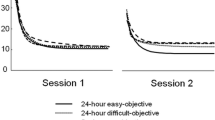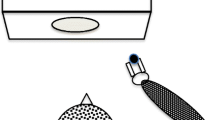Summary
The present study was designed to test facilitating and debilitating effects of motivational processes on motor behavior. It was predicted that motivational processes have a more pronounced effect on motor performance when control is frequently transferred to attentional mechanisms (i. e., early in the acquisition phase). The results were consistent with this expectation. A strong motive to achieve success and pretreatment designed to enhance achievement motivation were associated with an increase in the quality of performance. A strong tendency to engage in state-oriented cognitive activities, by contrast, (e.g., thinking about the potential threat to one's selfesteem resulting from failure) was associated with poorer performance, It is concluded that experiments on motor behavior in which subjects are instructed to perform a single motor task may actually involve dual-task (or even multiple-task) performance if some part of the subjects' attentional capacity is used for task-irrelevant cognitive activities.
Similar content being viewed by others
References
Atkinson, J.W. (1958). Motives in Fantasy, Action, and Society. Princeton, N.J.: Van Nostrand.
Atkinson, J.W. & Birch, D. (1970). The Dynamics of Action. New York: Wiley.
Atkinson, J.W. & Cartwright, D. (1964). Some neglected variables in contemporary conceptions of decision and performance. Psychological Reports, 14 575–590.
Atkinson, J.W. & Feather, N.T. (1966). A Theory of Achievement Motivation. New York: Wiley.
Bernstein, N. (1967). The Coordination and Regulation of Movements. Oxford, Eng.: Pergamon.
Carver, C.S. & Scheier, M.F. (1981). Attention and Self-Regulation: A Control-Theory Approach to Human Behavior. New York: Springer.
Carver, C.S. & Scheier, M.F. (In press). A control-systems approach to the self-regulation of action. In: J. Kuhl and J. Beckmann (Eds.), Action Control: From Cognition to Behavior. New York: Springer, in press.
Fishbein, M. & Ajzen, I. (1975). Belief, Attitude, Intention, and Behavior. Reading, Mass.: Addison-Wesley.
Heckhausen, H. (1963). Hoffnung und Furcht in der Leistungsmotivation. Meisenheim: Hain.
Heckhausen, H. (1977). Achievement motivation and its constructs: A cognitive model. Motivation and Emotion, 1 283–329.
Holding, D.H. (Ed.) (1981). Human Skills. New York: Wiley.
Kuhl, J. (1977). Meß- und prozeßtheoretische Analysen einiger Person- und Situationsparameter der Leistungsmotivation. Bonn: Bouvier.
Kuhl, J. (1979). Standard setting and risk preference: An elaboration of the theory of achievement motivation and an empirical test. Psychological Review, 85 239–248.
Kuhl, J. (1981). Motivational and functional helplessness: The moderating effect of state versus action orientation. Journal of Personality and Social Psychology, 40 155–170.
Kuhl, J. (1983). Motivation, Konflikt und Handlungskontrolle. Berlin, Heidelberg, New York: Springer.
Kuhl, J. (1984). Volitional aspects of achievement motivation and learned helplessness: Toward a comprehensive theory of action control. In: B.A. Maher (Ed.), Progress in Experimental Personality Research (Vol. 13). New York: Academic Press.
Kuhl, J. & Blankenship, V. (1979). The dynamic theory of achievement motivation: From episodic to dynamic thinking. Psychological Review, 86 141–151.
Kuhl, J. & Weiß, M. (1983). Performance deficits following uncontrollable failure: Impaired action control or global attributions and generalized expectancy deficits. Manuscript submitted for publication. Max-Planck-Institute for Psychological Research, Munich, FRG, 1983.
Lazarus, R.S. (1966). Psychological Stress and the Coping Process. New York: McGraw-Hill.
Lichtenberg, G.C. (1962). Aphorismen, Briefe, Satiren. Düsseldorf: Diederichs.
Locke, E.A. (1968). Toward a theory of task motivation and incentives. Organizational Behavior and Human Performance, 3 157–189.
McLeod, P.D. (1977). A dual task response modality effect: Support for multiprocessor models of attention. Quarterly Journal of Experimental Psychology, 29 651–669.
Miller, G.A., Galanter, E. & Pribram, K.H. (1960). Plans and the Structure of Behavior. New York: Holt.
Powers, W.T. (1973). Behavior: The Control of Perception. Chicago: Aldine.
Powers, W.T. (1978). Quantitative analysis of purposive systems: Some spadework at the foundations of scientific psychology. Psychological Review, 85 417–435.
Requin, J., Bonnet, M. & Semjen, A. (1977). Is there a specificity in the supraspinal control of motor structures during preparation? In: S. Dornic (Ed.), Attention and Performance VI. Hillsdale, N.J.: Erlbaum.
Summers, J.J. (1981). Motor programs. In: D.H. Holding (Ed.), Human Skills (pp. 41–117), New York: Wiley.
Tucholsky, K. (1967). Gesammelte Werke. Band 1 (1907–1924), Reinbeck: Rowohlt.
Volpert, W. (1974). Handlungsstrukuranalyse als Beitrag zur Qualifikationsforschung. Köln: Paul-Rugenstein.
Wine, J.D. (1982). Evaluation anxiety: A cognitive-attentional construct. In: Krohne, H.W. & Laux, L.C. (Eds.), Achievement, Stress, and Anxiety. Washington, D.C.: Hemisphere.
Author information
Authors and Affiliations
Rights and permissions
About this article
Cite this article
Kuhl, J., Koch, B. Motivational determinants of motor performance: The hidden second task. Psychol. Res 46, 143–153 (1984). https://doi.org/10.1007/BF00308599
Issue Date:
DOI: https://doi.org/10.1007/BF00308599




